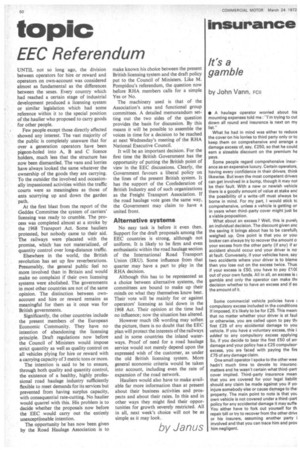topic
Page 52

If you've noticed an error in this article please click here to report it so we can fix it.
EEC Referendum
UNTIL not so long ago, the division between operators for hire or reward and operators on own-account was considered almost as fundamental as the differences between the sexes. Every country which had reached a certain stage of industrial development produced a licensing system or similar legislation which had some reference within it to the special position of the haulier who proposed to carry goods for other people.
Few people except those directly affected showed any interest. The vast majority of the public is completely unaware that for over a generation operators have been pigeon-holed into A, B and C licence holders, much less that the structure has now been dismantled. The vans and lorries have always looked the same whatever the ownership of the goods they are carrying. To the outsider the involved and occasionally impassioned activities within the traffic courts were as meaningless as those of ants scurrying up and down the garden path.
At the first blast from the report of the Geddes Committee the system of carriers' licensing was ready to crumble. The process was completed almost at a stroke by the 1968 Transport Act. Some hauliers protested, but nobody came to their aid. The railways were placated with the promise, which has not materialized, of quantity control over long-distance traffic.
Elsewhere in the world, the British revolution has set up few reverberations. Presumably, the general public feel no more involved than in Britain and would make no complaint if their own licensing systems were abolished, The governments in most other countries are not of the same opinion. The distinction between ownaccount and hire or reward remains as meaningful for them as it once was for British governments, Significantly, the other countries include the present members of the European Economic Community. They have no intention of abandoning the licensing principle. Draft regulations now before the Council of Ministers would impose strict quantity as well as quality control on all vehicles plying for hire or reward with a carrying capacity of 3 metric tons or more.
The intention is said to be to ensure, through both quality and quantity control, the existence of a healthy, highly professional road haulage industry sufficiently flexible to meet demands for its services but prevented from having surplus capacity, with consequential rate-cutting. No haulier would quarrel with this. His problem is to decide whether the proposals now before the EEC would carry out the entirely unexceptionable intention.
The opportunity he has now been given by the Road Haulage Association is to make known his choice between the present British licensing system and the draft policy put to the Council of Ministers, Like M. Pompidou's referendum, the question now before RHA members calls for a simple Yes or No.
The machinery used is that of the Association's area and functional group committees, A detailed memorandum setting out the two sides of the question provides the basis for discussion. By this means it will be possible to assemble the voices in time for a decision to be reached at next Wednesday's meeting of the RHA National Executive Council.
It will be an important decision. For the first time the British Government has the opportunity of putting the British point of view in the EEC discussions. Clearly, the Government favours a liberal policy on the lines of the present British system. It has the support of the Confederation of British Industry and of such organizations as the Freight Transport Association. If the road haulage vote goes the same way, the Government may claim to have a united front.
Alternative systems
No easy task is before it even then. Support for the draft proposals among the EEC countries is strong, although not uniform. It is likely to be firm and even enthusiastic within the road haulage section of the International Road Transport Union (IRU). Some influence from that quarter may have a part to play in the RHA decision.
Although this has to be represented as a choice between alternative systems, the committees are bound to make up their minds on what they themselves know best. Their vote will be mainly for or against operators' licensing as laid down in the 1968 Act. Their opinion at the time had no influence; now the situation has altered.
However much the wording may soften the picture, there is no doubt that the EEC plan will protect the interests of the railways and in some countries the inland waterways. Proof of need for a road haulage service would not merely depend upon the expressed wish of the customer, as under the old British licensing system. More general economic criteria would be taken into account, including even the rate of expansion of the road network.
Hauliers would also have to make available far more information than at present about their business activities and prospects and about their rates. In this and in other ways they might find their opportunities for growth severely restricted. All in all, next week's choice will not be as simple as it may look.




















































































































































